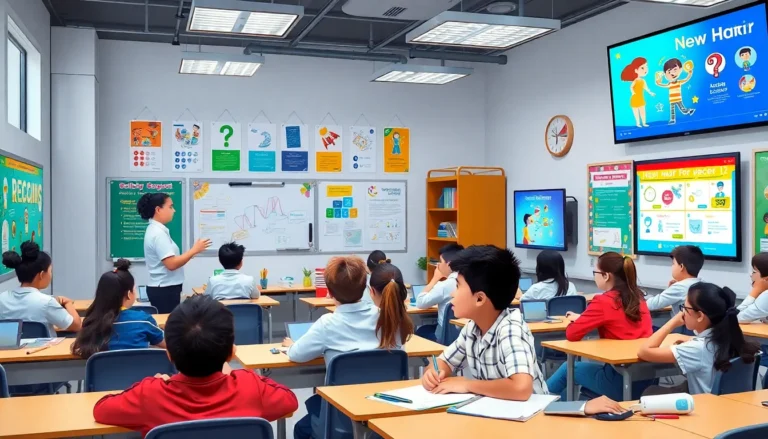Table of Contents
ToggleIn a world where TikTok dances can earn you fame and fortune, one might wonder if traditional education still holds its ground. Spoiler alert: it does! Education in the United States serves as the backbone of personal growth, economic stability, and societal progress. It’s not just about memorizing dates and formulas; it’s about shaping critical thinkers who can tackle the challenges of tomorrow.
From sparking creativity to fostering innovation, education equips individuals with the tools they need to navigate life’s complexities. In a rapidly changing job market, it’s the key to unlocking opportunities and ensuring a brighter future. So, while some might argue that a college degree is as useful as a chocolate teapot, the truth is, education remains a powerful force driving success and empowerment across the nation.
Overview of Education in the United States
Education in the United States plays a crucial role in shaping individuals and society. Exploring its historical context and current trends reveals significant insights about its evolving function.
Historical Context
Education in the US has roots tracing back to the early colonial period, where it primarily served religious and practical purposes. The establishment of common schools in the 19th century increased access to education, paving the way for universal public schooling. Landmark legislation, such as the Elementary and Secondary Education Act of 1965, aimed to promote equal educational opportunities for all students. Major reforms emerged in the late 20th century, focusing on higher standards and accountability. This transformation marked a shift towards inclusivity and relevance in education, adapting to societal needs.
Current Trends
Current trends in education reflect a blend of innovative practices and technology integration. Many schools emphasize STEM (science, technology, engineering, and mathematics) curricula, equipping students with essential skills for modern careers. Increased focus on social-emotional learning addresses students’ psychological well-being, fostering holistic growth. Online and blended learning environments gain traction, providing flexible learning options that expand accessibility. Educators increasingly incorporate project-based learning to develop critical thinking and problem-solving abilities. These trends highlight the fluid nature of education in the United States, continually adapting to prepare individuals for the dynamic world.
Economic Value of Education
Education plays a crucial role in enhancing economic prospects for individuals and communities. Through education, individuals obtain skills and knowledge that directly influence their employability.
Impact on Employment Opportunities
Access to education significantly improves job prospects. Research shows that individuals with a bachelor’s degree earn approximately 66% more than those with only a high school diploma. Employers often prioritize candidates with advanced degrees, creating a competitive job market. Education equips individuals with essential skills, enhancing adaptability in rapidly changing industries. Effective communication, critical thinking, and problem-solving become vital strengths that increase employability, leading to better job placements and career advancement.
Contribution to Economic Growth
Investing in education drives overall economic growth. Countries with higher education levels experience increased productivity and innovation, contributing to GDP increases. For instance, every additional year of schooling increases individual productivity by about 10%. Education fosters a skilled workforce capable of meeting the challenges of a modern economy. As individuals gain knowledge, they also contribute to local and national economies through higher wages and increased spending. Ultimately, education serves as a foundation for sustainable economic development.
Social Value of Education
Education holds significant social value in the United States today, shaping communities and promoting social cohesion. It plays a crucial role in fostering equality among diverse groups.
Role in Promoting Equality
Education serves as a pathway to bridge societal gaps. Access to quality education equips individuals from different backgrounds with similar opportunities for advancement. For instance, data shows that students from low-income families benefit substantially from public education initiatives aimed at equalizing access. Programs designed to support underprivileged students not only enhance individual potential but also contribute to a more equitable society. Schools that focus on inclusivity cultivate diverse environments that respect and celebrate differences, ultimately reducing disparities in educational outcomes.
Fostering Civic Engagement
Active citizenship stems from a strong educational foundation. Education encourages individuals to participate in their communities, leading to informed decision-making and civic responsibility. Courses that cover history, government, and social studies promote awareness of civic rights and duties. It’s reported that students engaged in community service through educational programs possess a higher likelihood of voting and taking part in local governance. By developing skills like critical thinking and collaboration, education empowers individuals to address societal issues collectively and work toward solutions that benefit all.
Personal Value of Education
Education plays a crucial role in shaping individual lives, fostering personal development, and enabling social engagement. This importance manifests in various areas, especially in cultivating critical thinking and promoting lifelong learning.
Development of Critical Thinking
Critical thinking skills are essential in today’s fast-paced world. Education equips individuals to analyze information critically, evaluate arguments, and make informed decisions. By engaging in discussions and problem-solving activities, students learn to view issues from multiple angles. This ability enhances their contribution to society, as they approach challenges thoughtfully and constructively. Many employers prioritize candidates with strong critical thinking skills, making this educational outcome invaluable in a competitive job market.
Lifelong Learning and Personal Growth
Lifelong learning remains a key benefit of education. It encourages individuals to continue seeking knowledge beyond formal schooling, enhancing their adaptability and resilience. Education fosters a curiosity that drives personal growth throughout a person’s life. Whether through self-directed study or participation in community programs, the pursuit of knowledge encourages individuals to explore new interests. Adults who engage in lifelong learning often experience improved job satisfaction and overall well-being, contributing to a more fulfilled life.
Challenges Facing Education Today
Education in the United States faces significant challenges that impact its effectiveness and accessibility.
Inequality in Access
Inequality in access to education remains a pressing issue. Students from low-income families often attend underfunded schools, which lack proper resources. Disparities exist in educational opportunities based on geographic location and socioeconomic status. Many urban and rural schools struggle with overcrowded classrooms and outdated materials. Research indicates that students in affluent areas perform better academically than their peers in disadvantaged communities. Achieving equity requires targeted funding and policies focused on leveling the playing field. Programs providing mentorship and support for underprivileged students can also bridge the opportunity gap.
Adapting to Technological Changes
Adapting to technological changes presents both challenges and opportunities. The rapid advancement of digital tools significantly alters the educational landscape. Many teachers require training to effectively integrate technology into their curriculum. Additionally, students benefit from learning environments enriched with interactive platforms and resources. However, disparities in access to technology can exacerbate existing inequalities. Not all students have access to high-speed internet or devices necessary for online learning. Emphasizing digital literacy skills is crucial for helping students prepare for the workforce. Schools need to implement curriculum revisions that incorporate technology while ensuring equitable access for all learners.
Education in the United States remains a cornerstone of personal and societal development. It empowers individuals with critical skills necessary for navigating an ever-changing world. As it evolves to meet contemporary challenges and embraces technological advancements, education continues to be a catalyst for economic growth and social equity.
The ongoing pursuit of knowledge fosters resilience and adaptability, essential traits in today’s workforce. By prioritizing equal access to quality education, society can ensure that every individual has the opportunity to thrive. Ultimately, education’s value transcends mere credentials; it’s about equipping individuals to contribute meaningfully to their communities and the nation as a whole.







